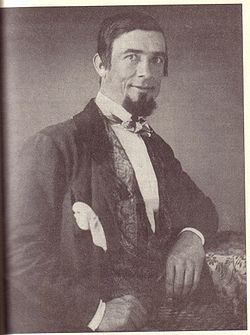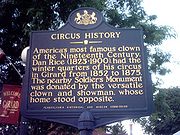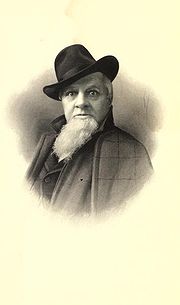
Dan Rice
Encyclopedia

- For Daniel Rice, see Daniel Rice
Dan Rice (January 23, 1823 – February 22, 1900), was an American
United States
The United States of America is a federal constitutional republic comprising fifty states and a federal district...
entertainer of many talents, most famously as a clown
Clown
Clowns are comic performers stereotypically characterized by the grotesque image of the circus clown's colored wigs, stylistic makeup, outlandish costumes, unusually large footwear, and red nose, which evolved to project their actions to large audiences. Other less grotesque styles have also...
, who was pre-eminent before the American Civil War
American Civil War
The American Civil War was a civil war fought in the United States of America. In response to the election of Abraham Lincoln as President of the United States, 11 southern slave states declared their secession from the United States and formed the Confederate States of America ; the other 25...
. During the height of his career, Rice was a household name. Coining the terms "One Horse Show" and "Greatest Show", he was a leading personality in the new American "pop culture", brought on by the technological changes of the Industrial Revolution
Industrial Revolution
The Industrial Revolution was a period from the 18th to the 19th century where major changes in agriculture, manufacturing, mining, transportation, and technology had a profound effect on the social, economic and cultural conditions of the times...
and resultant mass culture. Rice became so popular he ran for President of the United States
President of the United States
The President of the United States of America is the head of state and head of government of the United States. The president leads the executive branch of the federal government and is the commander-in-chief of the United States Armed Forces....
in 1868. With changes in circus venues and popular culture after the Civil War, his legendary talents under the big top have gradually slipped into almost total historical obscurity such that in 2001, biographer David Carlyon called him "the most famous man you've never heard of".
Biography

New York City
New York is the most populous city in the United States and the center of the New York Metropolitan Area, one of the most populous metropolitan areas in the world. New York exerts a significant impact upon global commerce, finance, media, art, fashion, research, technology, education, and...
, Rice gained 19th century fame with many talents, most of which involved him gallivanting around as a clown figure in circus
Circus
A circus is commonly a travelling company of performers that may include clowns, acrobats, trained animals, trapeze acts, musicians, hoopers, tightrope walkers, jugglers, unicyclists and other stunt-oriented artists...
es. In addition to his 'clowning' talents, he was an animal trainer
Animal training
Animal training refers to teaching animals specific responses to specific conditions or stimuli. Training may be for the purpose of companionship, detection, protection, entertainment or all of the above....
, song writer, commentator, political humorist, strong man
Strongman (circus)
The circus strongman is one of many acts found in a modern circus. The strongman demonstrates great strength, power and agility to the audience. The strongman and strongwomen were very popular attractions in the circus in the 19th century....
, actor, director, producer, dancer, and politician. He ran for Senate
United States Senate
The United States Senate is the upper house of the bicameral legislature of the United States, and together with the United States House of Representatives comprises the United States Congress. The composition and powers of the Senate are established in Article One of the U.S. Constitution. Each...
, Congress, and President of the United States
President of the United States
The President of the United States of America is the head of state and head of government of the United States. The president leads the executive branch of the federal government and is the commander-in-chief of the United States Armed Forces....
— dropping out of each race.
Rice changed the circus into what it is today by mixing animals, acrobats and clowns. His first break came in 1841, when he got a job of presenting a pig named Sybil who could do many tricks, including the ability to tell time. From there he moved on to singing and dancing, and got caught up briefly in the popularity of the 'negro song', singing in blackface
Blackface
Blackface is a form of theatrical makeup used in minstrel shows, and later vaudeville, in which performers create a stereotyped caricature of a black person. The practice gained popularity during the 19th century and contributed to the proliferation of stereotypes such as the "happy-go-lucky darky...
. Gaining fame and popularity, he changed styles once again; he starred in various parodies
Parody
A parody , in current usage, is an imitative work created to mock, comment on, or trivialise an original work, its subject, author, style, or some other target, by means of humorous, satiric or ironic imitation...
of works by William Shakespeare
William Shakespeare
William Shakespeare was an English poet and playwright, widely regarded as the greatest writer in the English language and the world's pre-eminent dramatist. He is often called England's national poet and the "Bard of Avon"...
, including that of "Dan Rice's Version of Othello
Othello
The Tragedy of Othello, the Moor of Venice is a tragedy by William Shakespeare, believed to have been written in approximately 1603, and based on the Italian short story "Un Capitano Moro" by Cinthio, a disciple of Boccaccio, first published in 1565...
" and "Dan Rice's Multifarious Account of Shakespeare's Hamlet
Hamlet
The Tragical History of Hamlet, Prince of Denmark, or more simply Hamlet, is a tragedy by William Shakespeare, believed to have been written between 1599 and 1601...
". He would perform these with various songs and dialects. "Rice was not simply funnier than other clowns; he was different, mingling jokes, solemn thoughts, civic observations, and songs."
Expanding his horizons, he went into producing his own shows, and often had more than one tour going on at the same time. He wanted to move on from his frivolous clowning, and reinvented himself into a gentleman. He started to take up politics and would often have Democratic
Democratic Party (United States)
The Democratic Party is one of two major contemporary political parties in the United States, along with the Republican Party. The party's socially liberal and progressive platform is largely considered center-left in the U.S. political spectrum. The party has the lengthiest record of continuous...
undertones in his shows. He was then regarded as not only a multi-talented performer, but a smart and noble man who was to be admired. He won the affection of many newspapers and publicists, including those of a then unknown Mark Twain
Mark Twain
Samuel Langhorne Clemens , better known by his pen name Mark Twain, was an American author and humorist...
and Walt Whitman
Walt Whitman
Walter "Walt" Whitman was an American poet, essayist and journalist. A humanist, he was a part of the transition between transcendentalism and realism, incorporating both views in his works. Whitman is among the most influential poets in the American canon, often called the father of free verse...
. Mark Twain paid him homage in his description of a circus in Adventures of Huckleberry Finn
Adventures of Huckleberry Finn
Adventures of Huckleberry Finn is a novel by Mark Twain, first published in England in December 1884 and in the United States in February 1885. Commonly named among the Great American Novels, the work is among the first in major American literature to be written in the vernacular, characterized by...
, and it is likely a boyhood Twain actually saw Rice perform when his circus came to Hannibal for a show.
His shows became more famous than any of the other shows touring at the time, including that of rival, Phineas Taylor Barnum. During the 19th century, his name was synonymous with theater. He reinvented the theater into a vaudevillian style before there was vaudeville
Vaudeville
Vaudeville was a theatrical genre of variety entertainment in the United States and Canada from the early 1880s until the early 1930s. Each performance was made up of a series of separate, unrelated acts grouped together on a common bill...
. He was very patriotic, later influencing the likes of George M. Cohan
George M. Cohan
George Michael Cohan , known professionally as George M. Cohan, was a major American entertainer, playwright, composer, lyricist, actor, singer, dancer, and producer....
. He was also one of the main models for "Uncle Sam
Uncle Sam
Uncle Sam is a common national personification of the American government originally used during the War of 1812. He is depicted as a stern elderly man with white hair and a goatee beard...
".
Expressions

- Rice campaigned for Zachary TaylorZachary TaylorZachary Taylor was the 12th President of the United States and an American military leader. Initially uninterested in politics, Taylor nonetheless ran as a Whig in the 1848 presidential election, defeating Lewis Cass...
as president, inviting him to campaign on the circus bandwagonWagonA wagon is a heavy four-wheeled vehicle pulled by draught animals; it was formerly often called a wain, and if low and sideless may be called a dray, trolley or float....
, whence the expression "to jump on the bandwagon"Bandwagon effectThe bandwagon effect is a well documented form of groupthink in behavioral science and has many applications. The general rule is that conduct or beliefs spread among people, as fads and trends clearly do, with "the probability of any individual adopting it increasing with the proportion who have...
. - Early in his career, Rice was down on his luck and only had one horse (in early circuses the core show was a horse show). His competitors mocked him, saying it was a "one horse show" as a derogatory. Rice was able to turn the expression around by putting on a good show, and it became famously attached to him for the rest of his life.
- The rallying cry of "Hey, Rube!Hey, Rube!"Hey, Rube!" is a slang phrase most commonly used in the United States by circus and travelling carnival workers , with origins in the middle 19th century. It is a rallying call, or a cry for help, used by carnies in a fight with outsiders...
" - later transformed into a noun - originated in New Orleans in 1848 when a member of Rice's troupe was attacked by a mob and he yelled to his friend Reuben, "Hey, Rube!". The phrase is most commonly known today in the circus world as a "Hey, Rube" meaning "come help in this fight". - Decades before other circuses used the phrase, an Arkansas paper praised Rice's as "The Greatest Show on Earth."
- The town of Girard, PennsylvaniaGirard, PennsylvaniaGirard is a borough in Erie County, Pennsylvania, United States. The population was 3,164 at the 2000 census. It is part of the Erie Metropolitan Statistical Area.-Geography:Girard is located at ....
, has annual Dan Rice Days http://danricedays.com community event each summer in early August.

